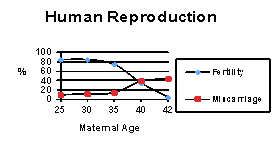Clomiphene Citrate Challenge Test (CCCT)
Reproductive potential in women declines with age. This is reflected in the decreased ability to conceive and an increased rate of miscarriage with advancing age. The chances for chromosomal abnormalities in offspring such as Down Syndrome also increase after the age of 35. Approximately, one-third of couples in which the female partner is age 35 or older will have problems with fertility. Approximately, two-thirds of couples in which the female partner is 40 or more will have problems conceiving. The clomiphene citrate challenge test was designed to predict the fertility potential of older female patients.
 Clomiphene citrate is the generic name of a fertility pill which is used to induce ovulation. Brand names include Clomid and Serophene. This medication is associated with an 8% risk of twinning (normal risk is 1%) and about 1/1000 risk of triplets or more. Side effects include hot flashes, dizziness, headaches and ovarian cyst development which usually spontaneously resolve in 1-2 months.
Clomiphene citrate is the generic name of a fertility pill which is used to induce ovulation. Brand names include Clomid and Serophene. This medication is associated with an 8% risk of twinning (normal risk is 1%) and about 1/1000 risk of triplets or more. Side effects include hot flashes, dizziness, headaches and ovarian cyst development which usually spontaneously resolve in 1-2 months.
For counting purposes, the first day of your period is cycle day 1, the second day is cycle day 2 and the third day is cycle day 3 and so on.
CYCLE DAY NUMBER | WHAT TO DO |
|---|---|
1 | |
2 | |
3 | Blood drawn for FSH level |
4 | |
5 | Take 2 pills of clomiphene |
6 | Take 2 pills of clomiphene |
7 | Take 2 pills of clomiphene |
8 | Take 2 pills of clomiphene |
9 | Take 2 pills of clomiphene |
10 | Blood drawn for FSH level |
Results
If you fail the clomiphene citrate challenge test, your chance for conceiving is about 2% regardless of the fertility treatment used such as ovulation induction or IVF. If you fail the test you may want to consider in vitro fertilization with donor eggs or adoption. If you pass the CCCT, then more fertility treatment with your eggs may be an option.
